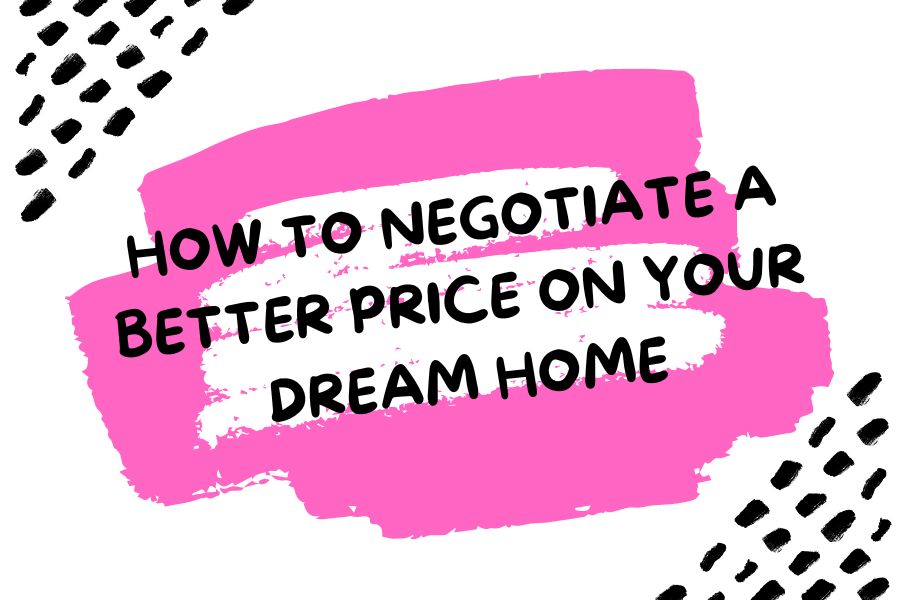
Buying a home is one of the most significant financial investments you’ll make in your lifetime. It’s not just about finding a place to live; it’s about finding your sanctuary, your haven, your dream home. The process can be daunting, especially when it comes to negotiating the price. However, with a strategic approach and some savvy tactics, you can negotiate a better price on your dream home without compromising your sanity.
How to Negotiate a Better Price on Your Dream Home
Do Your Homework-
Knowledge is power, especially in negotiations. Research the local real estate market thoroughly to understand current trends, property values, and comparable sales in the area. This information will give you a realistic idea of what the home is worth and empower you during negotiations.
Get Pre-Approved for a Mortgage-
Having a pre-approved mortgage not only demonstrates to sellers that you’re serious but also gives you a clear understanding of your budget and purchasing power. This information is invaluable when negotiating, as it allows you to make confident offers within your financial means.
Understand the Seller’s Motivation-
Every seller has their reasons for putting their home on the market, whether it’s downsizing, relocating, or financial necessity. Understanding their motivation can give you insight into their willingness to negotiate. For example, a seller who needs to move quickly may be more inclined to accept a lower offer.
Build a Strong Relationship with the Seller-
Establishing rapport with the seller can work in your favor during negotiations. Be courteous, respectful, and transparent throughout the process. Show genuine interest in the property while also being honest about your concerns and requirements. A positive relationship can make the seller more receptive to your offers.
Identify Potential Negotiation Points-
Before entering negotiations, identify areas where you can potentially negotiate, such as the purchase price, closing costs, repairs or renovations, and inclusion of appliances or furniture. Having a clear understanding of what’s negotiable allows you to focus your efforts strategically.
Start with a Strong but Reasonable Offer-
Your initial offer sets the tone for negotiations. Make it strong enough to get the seller’s attention but reasonable enough to not offend them. Base your offer on market research and comparable sales, and be prepared to justify your offer with facts and figures.
Be Flexible and Willing to Compromise-
Negotiations are a two-way street, and compromise is often necessary to reach a mutually beneficial agreement. Be open to adjusting your offer or terms based on the seller’s response and any counteroffers they may make. Flexibility demonstrates your willingness to work towards a solution.
Use Strategic Timing-
Timing can play a significant role in negotiations. For example, making an offer at the end of the month when sellers may be more motivated to close deals to meet quotas or financial targets could work in your favor. Similarly, if the property has been on the market for a while, the seller may be more willing to negotiate.
Don’t Let Emotions Cloud Your Judgment-
Buying a home is an emotional experience, but it’s essential to keep your emotions in check during negotiations. Avoid becoming too attached to a particular property or letting the fear of losing it cloud your judgment. Stay focused on your goals and priorities, and be prepared to walk away if the terms are not favorable.
Consult with a Professional-
If negotiations become complex or overwhelming, don’t hesitate to seek guidance from a real estate agent or attorney experienced in negotiation. Their expertise can provide valuable insights and guidance to help you navigate the process effectively and secure the best possible deal.
In Conclusion
Negotiating a better price on your dream home requires preparation, strategy, and effective communication. By doing your homework, understanding the seller’s motivations, and approaching negotiations with flexibility and professionalism, you can increase your chances of success while ensuring a positive outcome for all parties involved. Remember, patience and persistence are key, and with the right approach, you can turn your dream home into a reality at a price that works for you.
